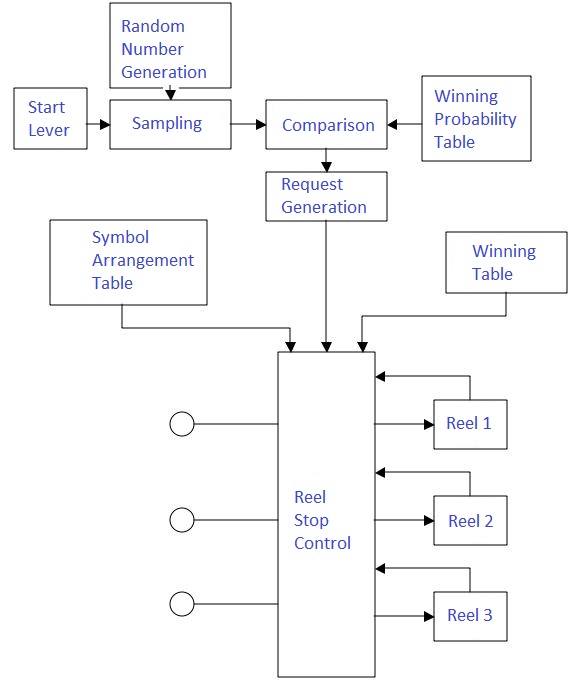Random Number Generator – RNG
The random number generator is the most important part of the slot machine Online Roulette, Video Poker and other games because it determines the outcome of every game. All modern slot machines are controlled by a computer, and one of the computer functions is to generate random numbers. However, computers are not random in any way at all, they follow a fixed sequence of instructions which is predictable. Starting from a set of conditions a computer will generate exactly the same sequence of random numbers time after time. In reality, there are very few things that are truly random. Real random numbers are non-deterministic. A Geiger counter generates a pulse every time it detects a radioactive decay. The time between decays has a strong pure random component. The known exponential distribution can be easily removed mathematically but the mean time between decays in background radiation rises early in the morning and falls at night.
There are non-random patterns lying hidden in the data which could be exploited by an analyst attempting to reduce his uncertainty for the next number in the sequence. An electronic slot machine needs a sequence that is unpredictable to the left; that is, the player cannot determine the next spin based on pattern analysis of previous spins. Unpredictability to the right is not required since it makes no difference if the player could infer an earlier sequence from a later sequence.
Pure random numbers are found in nature such as “quantum” events that happen inside individual atoms. For example, the gas inside a laser which stores bundles of “quanta” of energy and gives back as light. The time it takes for each atom to give back the energy is a random quantum event.
Signal noises are also pure random events. In a slot machine, the random number generator is a mathematical formula that produces a long sequence of numbers that appear as random. Theoretically, if one knew the formula and what the last number was, one could calculate the next one and so on.
To avoid this possibility, the slot machine runs its pseudo-random number generator continually whether it is played or not, so nobody has any idea what number it has generated at any one time. The sequence for these numbers has a finite time and always repeat itself.
A 32 binary number (2 raised to the 32 power) produces 4.3 billion numbers. If the slot machine runs the RNG 1000 times a second, a typical value, it will take 50 days to complete the sequence and start over. There are three types of random number generation methods:
- Toy generators provided by most programming languages and many software packages. These RNGs are used for small computer simulations such as waiting times for a queuing network.
- Serious generators which use 32 and 64 bits are found in video games and in slot machines.
- Truly random number generators which employ electronic circuits for measurements of natural phenomenon. These are used in the field of research (physics and even finance) and cryptography where security is vital for national defense.
For our purpose, we will examine the serious random number generators. Most slot machines have 22 stop positions on each reel, 11 symbols and 11 spaces (blank). However, we saw that internally, they have hidden virtual stops with many more positions. These positions are a list of numbers in the program of the computer. Each position is mapped to a stop on the physical reel, and when a particular number is chosen, the machine makes the physical reel stop at the corresponding place. When a coin or coins are inserted into the machine, the reels begin to spin and the computer pulls three numbers out of the subset of pseudo-random numbers.
They are very large numbers, anywhere between 1 and 4.3 billion. These numbers are then divided by the number of virtual stops and the remainder is kept in a memory block. Using our slot machine with 128 virtual stops, an “index” from 0 to 127 is used to look up a number in each virtual reel data and map it on the physical reel. The reduction from 4.3 billion to 127 means that every position on the virtual reel is pointed to by 34 million random numbers. Dropping a coin or hitting the button happens at a random time and the chances are very small that one can hit a particular number even if you knew it was about to come because the computer is generating numbers at a rate of about 1000 or more cycles per second.
The fundamental function of a random number generator can be shown in the chart below. At any time instant when the start button is actuated, a random number is sampled. The sampled value is, in turn, referred to a winning probability table to generate a request. Then referring to the symbol arrangement table and the winning table, each reel R1 to R3 is controlled so, as to provide a win corresponding to the request.
Random Number Generator Internal Controls
Gaming Control Boards (GCB) have developed strict planning and rigorous internal control of casino audits. Because of limited documentation of casino revenues, analytical reviews are used to test casino revenues. This is accomplished by comparing slot machines theoretical hold results to the actual results. As we mentioned earlier, theoretical hold or win as computed by reference to its payout schedule and reel setting are used as standards for the casinos. Deviation of the actual hold from theoretical hold percentage is a sign of either mechanical electrical or other performance problems. Some of the minimum requirements include testing of the following:
1) Coin in meter is functioning correctly
2) Coin in meter is read at least weekly and review for correctness
3) Theoretical/actual hold comparison made once a month
4) Statistical report reviewed by slot managers monthly
5) Any variation are to be investigated and resolved in a timely manner
These internal controls are established by casinos in order to comply with GCB inspectors and if not followed, casinos may lose their license. Our next chapter will take us inside the slot machine and provide the reader with a detail description of the many components that make up a modern three reel slot machine.


 (4.3 / 5)
(4.3 / 5)
 (4.2 / 5)
(4.2 / 5)


